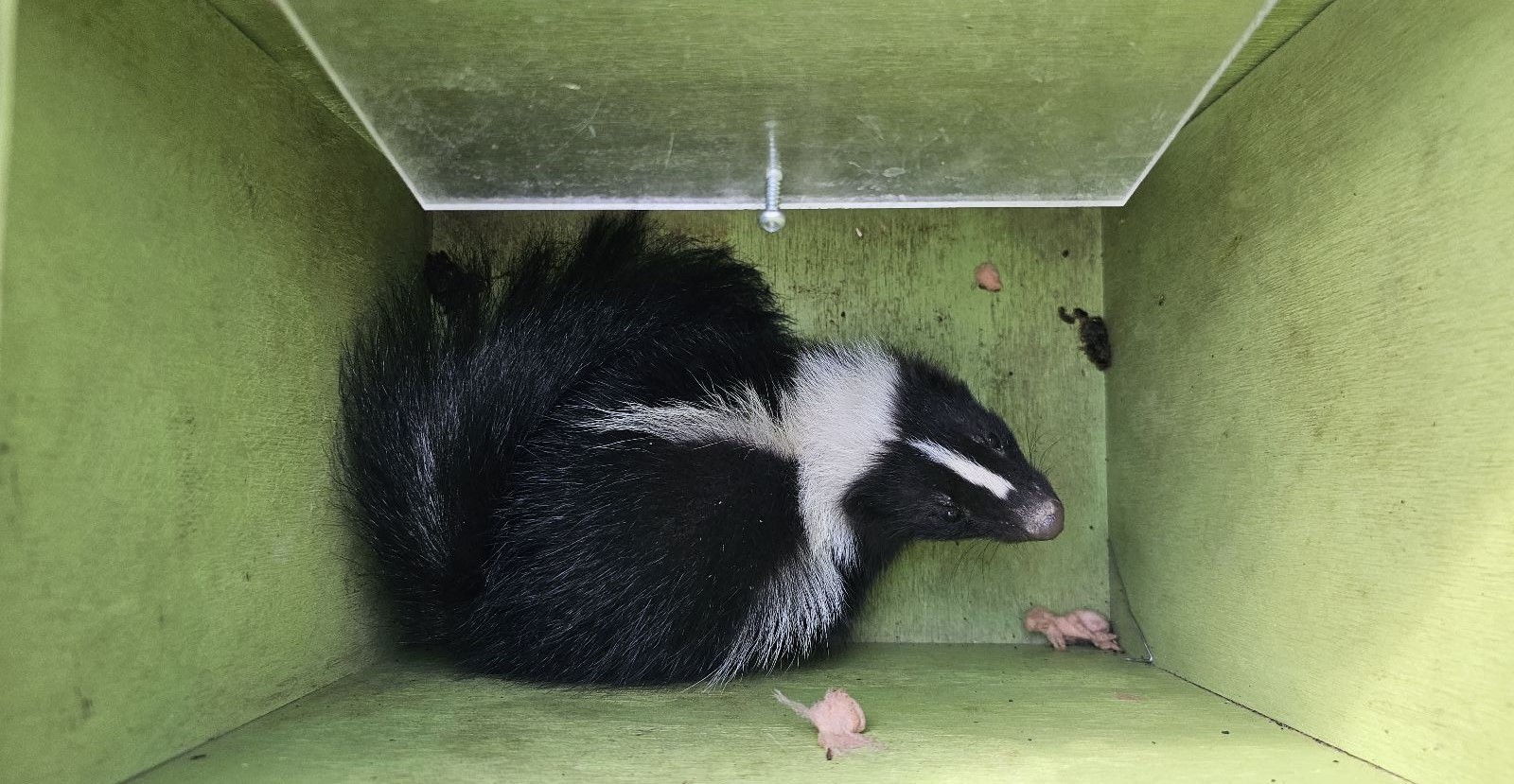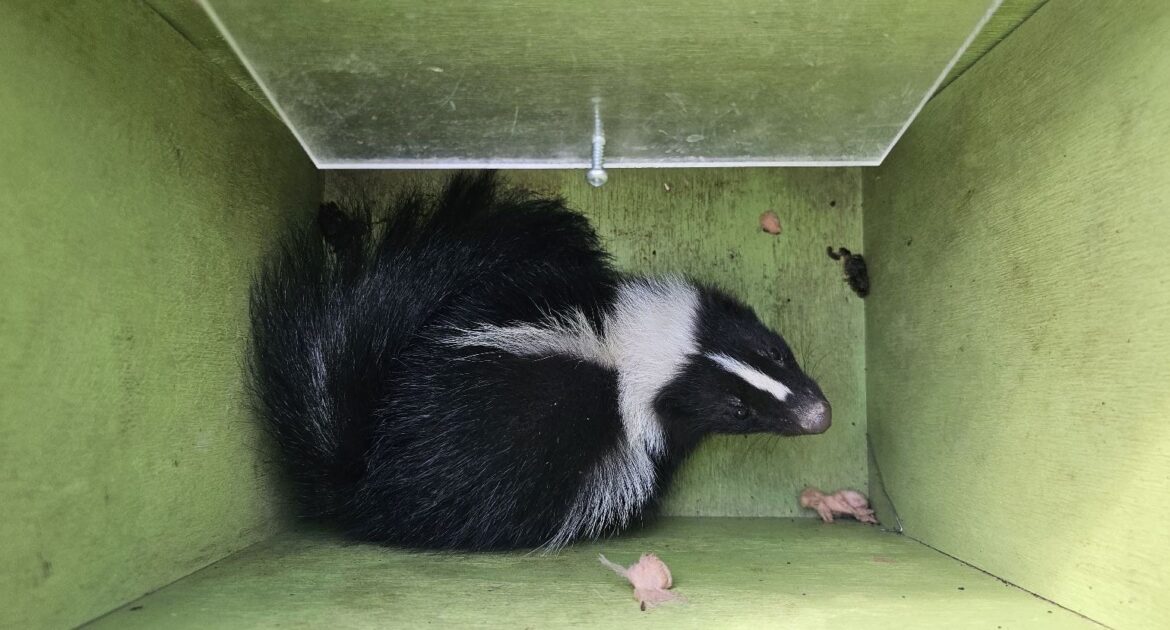Living in London, it’s easy to appreciate the charming wildlife that occasionally visits our gardens. However, when skunks decide to make themselves at home near your property, they can pose significant risks to your beloved pets.
At Skedaddle Humane Wildlife Control in London, we frequently assist homeowners facing the unique challenges of skunks. These striped visitors may seem harmless from a distance, but their defensive spray can turn a simple backyard encounter into a week-long ordeal for your pets. Understanding how to protect pets from skunks isn’t just about avoiding the infamous odour—it’s about ensuring your furry family members remain safe, healthy, and stress-free.
Understanding Skunk Behaviour Around Pets
Before discussing prevention strategies, it’s crucial to understand the behaviour of skunks around domestic animals. Skunks are non-aggressive creatures that prefer to avoid confrontation. However, they will defend themselves when they feel threatened—and curious pets often trigger this defensive response.
When Skunks Feel Threatened
Skunks follow a predictable pattern before spraying, including:
- Stamping their front feet as a warning
- Raising their tail and turning their back toward the perceived threat
- Hissing or growling to signal discomfort
- Finally, releasing their potent spray if the threat doesn’t retreat
Pets, especially dogs, often misinterpret these signals as playful behaviour, leading to unfortunate consequences. Understanding these warning signs can help you intervene before a spray occurs.
Seasonal Skunk Risks
The risk of skunk encounters with pets varies throughout the year:
- Spring (May-June): Female skunks with kits are particularly defensive and more likely to spray when protecting their young.
- Summer: Skunks become more active, foraging at dawn and dusk when many pet owners walk their dogs.
- Fall: Skunks search for winter den sites, often beneath structures on your property.
- Winter: Though less active, skunks don’t hibernate and may emerge during mild spells.
This seasonal awareness helps London pet owners adjust their vigilance appropriately. Many don’t realize that skunks can cause significant stress to pets beyond just spraying incidents, as their mere presence on your property can lead to ongoing anxiety.
Signs Skunks Have Moved Into Your London Property
Recognizing skunk activity early is key to protecting your pets. Our team at Skedaddle has identified several reliable indicators that skunks have established a presence near your home:
Visual and Physical Evidence
- Burrows and Entry Points: Skunks are excellent diggers, creating holes approximately 4-6 inches in diameter around the perimeter of structures. Check around your:
-
- Deck foundations
- Shed perimeters
- Porches
- Garden walls
- Yard Damage: Small, cone-shaped holes in your lawn indicate skunks searching for grubs and insects—their favourite food source.
- Droppings: Skunk scat resembles that of domestic cats but often contains insect parts and berry seeds.
Behavioural Changes in Your Pets
Your pets may detect skunks long before you do. Watch for changes such as:
- Unusual alertness or barking directed at specific areas of your yard
- Reluctance to enter certain outdoor spaces
- Intense sniffing along fence lines or structure perimeters
- Visible anxiety in the garden, especially at dawn or dusk
These behavioural changes often precede an actual skunk encounter and shouldn’t be dismissed. If your normally confident pet suddenly seems hesitant about venturing into a certain area of your garden, there may be a valid reason.
Health Risks to Pets from Skunk Encounters
Protecting pets from skunks involves understanding the full spectrum of health risks beyond the infamous spray.
Beyond the odour: Physical Risks
Direct Spray Exposure: While rarely causing permanent damage, skunk spray can cause:
- Temporary blindness or significant eye irritation
- Respiratory distress, particularly in small pets or those with existing conditions
- Nausea and vomiting if ingested during self-grooming
Rare But Serious Disease Risks: Skunks can potentially carry:
- Rabies
- Leptospirosis
- Roundworms that can transfer to pets
Psychological Impact on Pets
Pet Stress and Anxiety: The psychological impact of a skunk presence is often overlooked. It can lead to:
- Heightened stress hormones from persistent, unfamiliar scents
- Territory-related anxiety in cats
- Ongoing fearfulness in dogs after a spraying incident
One London client shared how their normally confident Labrador developed severe anxiety after a skunk encounter, refusing to use the garden for weeks. This psychological impact can significantly affect a pet’s quality of life and should be treated seriously alongside physical health concerns.
Effective Strategies to Protect Pets from Skunks
Preventing unpleasant skunk encounters with pets requires a multi-layered approach combining property modifications, behavioural training, and vigilant supervision.
Creating Skunk-Resistant Outdoor Spaces
Barrier Installation: Our Skedaddle technicians recommend:
- Installing heavy-gauge steel mesh 8-12 inches deep around foundations of decks, porches, and sheds
- Securing all potential entry points beneath structures
- Creating physical barriers that prevent skunks from accessing pet play areas
Habitat Modification:
- Remove food sources like fallen fruit and unsecured garbage
- Eliminate grub populations in lawns (skunks’ primary food source) using pet-safe methods
- Reduce dense ground-level vegetation where skunks may hide
Pet-Specific Safety Measures
- Supervised Outdoor Time: Always accompany pets outside during dawn and dusk when skunks are active.
- Training Commands: Teach an emergency recall command for immediate return if a skunk is spotted.
- Lighting Solutions: Install motion-sensor lights in dark areas of your garden—skunks prefer darkness and may avoid well-lit regions.
- Boundary Training: Work with your pets to establish clear boundaries in your garden, keeping them away from potential den sites.
London-Specific Tip: Many clients have found success with ultrasonic deterrent devices placed strategically around property perimeters, which emit frequencies uncomfortable for skunks but generally undetectable to pets.
Professional Solutions: When to Call Skedaddle
While prevention methods are effective, persistent skunk encounters may necessitate professional intervention. At Skedaddle Humane Wildlife Control in London, we offer humane solutions to help manage and prevent skunk problems in your area, ensuring your pets can enjoy outdoor spaces safely.
If you’re encountering these challenges, contact Skedaddle today to secure your property and peace of mind. We are here to help keep your pets safe and your home skunk-free.




